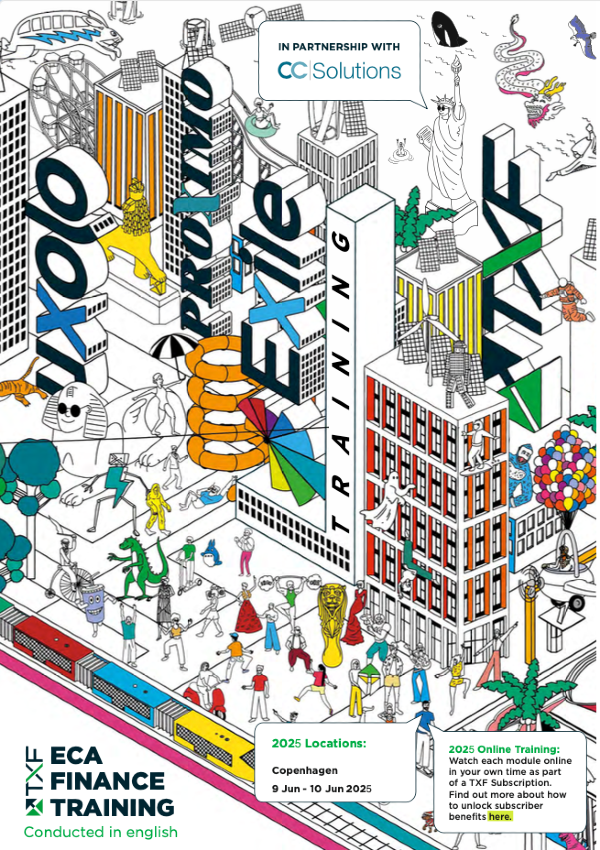Keynote: 2020 top five priorities for trade - a strategic view
TXF caught up with Citi’s John Ahearn to find out more about his newly-created role as chairman of trade to oversee strategic investments across the business, and what 2020 has in store for trade.

The trade finance industry continues to evolve as we know it and 2020 is already shaping up to be an interesting year with both challenges and opportunities. In order to stay ahead of the curve, Citi’s John Ahearn is now taking on a newly-created role of chairman of trade to oversee strategic investments across the business.
 Commenting on his new role, Ahearn said, “It's really important, as we need to position the business for the near future, especially given all the tumult the trade industry has gone through and will continue to experience.”
Commenting on his new role, Ahearn said, “It's really important, as we need to position the business for the near future, especially given all the tumult the trade industry has gone through and will continue to experience.”
So from his strategic view from the top, here are the key priorities as well as potential risks in the trade industry for this year,
Priority One: Mitigating existential risks to SCF
With many fintechs and new players recently coming on board to offer Supply Chain Finance (SCF), the business is reaching a critical inflection point. How so? It really comes down to what is considered debt and the accounting principles for the business.
To that end, big four accounting firms recently sent a letter to the US Federal Accounting Standards Board (FASB) on 2 October 2019 to ask for guidance about the financial reporting of SCF and whether it should be deemed debt on the balance sheets of large corporates.
This is largely precipitated by a variety of new entities closing some deals, both good and bad, that are raising attention on the business standards as a whole.
As one of the first and largest bank providers of SCF in the world, Citi has seen the evolution over the years and is currently monitoring the situation.
“If you look at 2019, we had a very, very good year at Citi. We grew our market share. We closed a lot of landmark transactions,” said Ahearn. “Overall, it was very positive, but against the backdrop of what’s happening with these newer entrants, there is risk in the industry. When I look at some of the transactions that we were presented with that did not meet our standards, it was because they were clearly debt-on-the-balance sheet deals, vs true supply chain finance. And yet those deals get done by others and go down on the record as SCF.”
Clients are more conscious of this shift as well and are more mindful of the safeguards banks like Citi put in place to help protect the ‘golden goose’. “Our clients are really honed in on the accounting treatment of the assets. We lead the market in that business and we have very clear guidelines on our approach,” Ahearn said.
This uncertainty also has the potential to create downstream effects with institutional investors who need to be assured of the quality of securitized trade assets in funds. That’s one of the reasons that Ahearn is working via BAFT on the Global Trade Industry Council to help create something akin to Equator Principles for SCF where players who use the term SCF only use it to mean certain things. “Otherwise we're going to see the industry using that generic SCF name for assets that are really debt driven structures and it's going to impact the whole industry,” he said.
Priority Two: Build it and they will come
The second top priority relates to consortiums and technology. What are the right investments to make, when is the right time, and how do you ensure innovation helps drive client adoption?
As an early adopter of innovation, Citi is one of the lead founders of TIN [Trade Information Network, which was previously called Project Wilson], and is in the commodities blockchain, Komgo. “The technology has moved dramatically, and the teams have done a very good job in building out that technology,” said Ahearn noting that Citi has been invited to join a variety of other consortiums. “The first question I ask is ‘what is the strategy to get the clients to convert?’”
Platform technology participation is an area that is complex, especially on the client-side where they often may need to make long-term infrastructure investments to fully utilize the capabilities to implement it.
“It is very interesting that when you talk to clients about blockchain, while everybody talks about it as a buzzword, very few truly have an understanding of the technology,” said Ahearn. “And many of our clients say they are interested in blockchain, but that they don't really have it as an approved technology within their firm, therefore they can’t migrate.”
Priority Three: Defining ‘greenwash’ versus real sustainability
Sustainability and ESG financing are now reaching a tipping point in expanding to Trade sectors, particularly around ensuring environmental practices for supply chains.
With the rising popularity of the trend; however, it is important that the industry decide on the key principles of how to define sustainability vs is what is ‘greenwashing’ or not verifiable.
One of the answers is standardisation. “We're working with the industry to try to create standards,” said Ahearn. “We're spending a lot of time with our clients asking ‘exactly what do you do to prove that this supplier is sustainable?’ This is increasingly important, especially with emerging market corporates. We don't want to be in a position where it becomes arbitrary, and open to interpretation, because that will create reputational risk for all participants.”
Priority Four: QE balancing in financing global trade
In this post-recession environment, has the whole de-risking debate worked its way out of the system? Do banks still want to get trade off their balance sheets in the wake of Basel regulations? In an increasingly global environment, the differences in interest rates and currency inflation may still create an impact.
“We see many participants in this market because of quantitative easing (QE). However, in my opinion, the pricing on some of these transactions coming through -- they're just not sustainable,” said Ahearn. “People are in this because of QE and negative interest rates. At some point, in a year, maybe two, the interest rate environment is going to reverse, and I think there will no longer be negative interest rates in the UK, Europe and other countries. And with that we anticipate a rapid shift in pricing which will come as a shock.”
How does that bode for the future of trade as an asset class? “The market will endure, and be liquid until QE ends. At this point, banks will question their participation, and start to unwind their positions, especially given the implications of Basel III,” Ahearn says.
Is that a problem for Citi? “No, we’re in a very good place because we've been running an originate-to-distribute model for a long time. We're also the largest asset distributor of all the banks. And so I don't think we'll be as impacted. But I think there's a lot of other banks that will be because they haven't built that distribution capability.”
Priority Five: Capitalising on the data opportunity
Data is going to be a whole new opportunity, if harnessed well. “There is no magic button or silver bullet to figure how this works. It takes tremendous discipline, planning and exhaustive inventory management,” says Ahearn. But its worth it because if we could harness that data, it’s an incredibly competitive proposition to be in. It’s a huge opportunity.”
Does Ahearn think the trade export finance market is going to stay relevant? “The industry is in the driver's seat, but we really need to work in a much more coordinated way,” Ahearn says. “It’s clear that many of these banks are not going to be able to compete, but they will still want to provide the service to the clients which can be cost-prohibitive,” Ahearn said. “Is there a role that a bank like Citi can continue to provide such services to other banks’ clients?” Watch this space.





